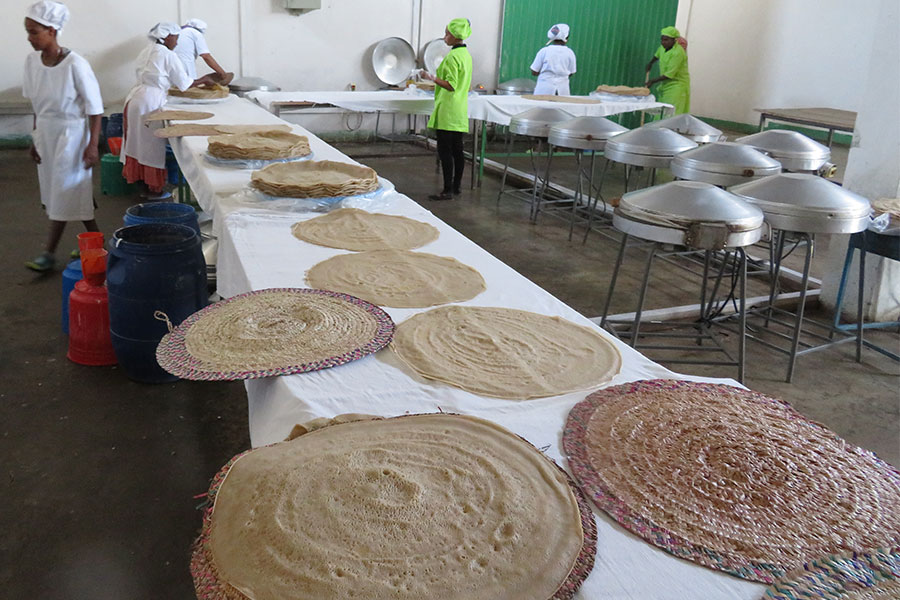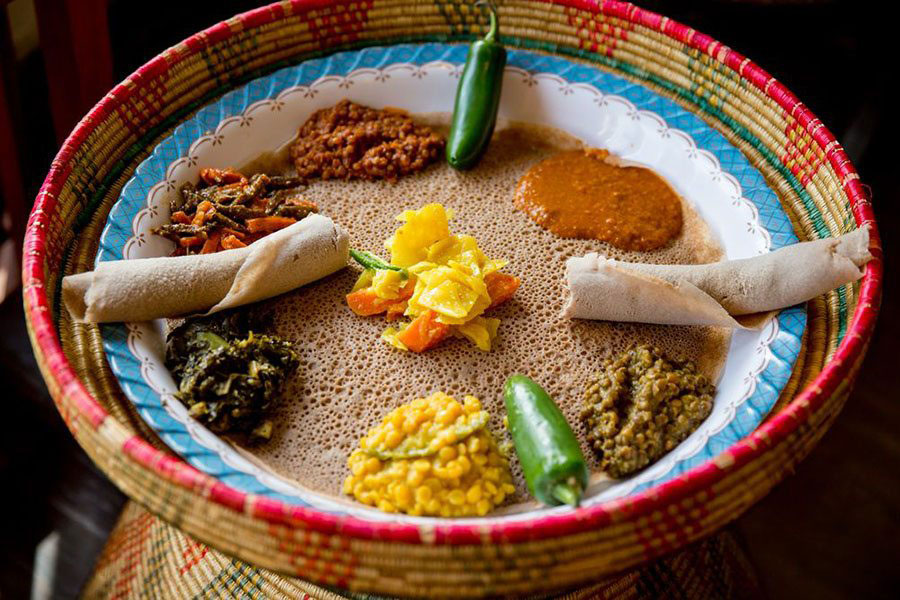
View From Arada | Aug 03,2019
Mar 23 , 2019
By Belay Abera
Food is vital for life, and no one knows this more than citizens in food-insecure countries. Ethiopia is one of them. The nation is currently under a safety-net program to alleviate persistent food insecurity spells in the country. Individuals in developing countries, spend over two-thirds of their income on food. This is a high price to pay to eat three meals a day.
Surprisingly, victims of droughts are from the food-producing portions of the population. Reductions in soil fertility, shrinking farm land and climate change have been the main factors behind this meager situation. This instance has made maintaining food security very difficult. The problem has continued with millions still in need of food aid.
Food security occurs when all people, at all times, have physical, social and economic access to sufficient, safe and nutritious food that meets their food preferences and dietary needs for an active and healthy life, according to the Food & Agriculture Organisation.
Over the coming decades, a changing climate, growing global population, rising food prices and a harsh climate will make meeting the food needs of citizens challenging. Adaptation strategies and policy responses to global change, including options for handling water allocation, land use patterns, food trade, post-harvest food processing and food prices and safety are urgently needed.
A number of points have been raised that the government could do to alleviate this problem. It includes the promotion of sustainable agricultural technologies, building resilience to shocks and balancing the nutritional benefits of meat against the ecological costs of its production. This though is easier said than done. There is no better indication of the challenges faced in last year’s Belgseason - between March and May - despite the efforts regarding the usual prescriptions by international partners.
Rains performed poorly over most northern Belg-producing areas, and this led harvests to be as much as 40pc below average, not to mention delayed by one to two months. Eastern Amhara and southern Tigray regional states were the most affected by this.
There were reports that matters have improved but political complications have meant that food security is a continuing problem. Massive displacement means that there is a need for large-scale and multi-sectoral assistance needs, according to the UN. This is because food producing households ability to engage in seasonal cultivation and the raising of livestock have been disrupted, a significant challenge for a nation whose farming population is largely subsistence.
This scenario is a testament to the fact that food security is a multi-dimensional phenomenon. Simplistic policy prescriptions for national and international political action will only cover a few holes, while the problem we are facing requires comprehensive stitching. It will not matter a great deal to close one hole as long as there are others still licking. Since food insecurity is about risks and uncertainty, the formal analysis should include both chronic sub-nutrition and transitory, and acute insecurity that reflects economic and food system volatility.
There are a number of elements that need to be considered together, including climatic variability, health status, spatial distribution within countries of poverty and forms of food insecurity. This requires careful mapping and a government that is willing to be transparent, whatever the damage to its reputation for not meeting goals may be.
A nation faced with new and rising challenges in food security should not stick to doing what it has been doing in the past. As the climate worsens and displacement takes its toll, the best policy prescriptions are the type drawn to address problems for the long term. The uncertainty of the source of food insecurity - whether it is climate or conflicts - cannot be addressed with short term goals with resources, planning and sectoral inputs mainly derived from the central government.
Without taking a broader view and walking the longer distance, the matter will recur without fail. Beefing up the capacity and mandate of the Ethiopian Food Security Coordination Strategy Directorate, under the Ministry of Agriculture, to the level of an agency could be an important step to take in this regard.
PUBLISHED ON
Mar 23,2019 [ VOL
19 , NO
986]


View From Arada | Aug 03,2019

Viewpoints | Jun 17,2023

Fortune News | Mar 20,2021

Featured | Mar 07,2020

View From Arada | Dec 11,2020

Commentaries | Sep 10,2021

Commentaries | Jul 09,2022

Commentaries | Dec 04,2022

Radar | Oct 12,2019

Commentaries | Dec 26,2020

My Opinion | 132202 Views | Aug 14,2021

My Opinion | 128617 Views | Aug 21,2021

My Opinion | 126536 Views | Sep 10,2021

My Opinion | 124140 Views | Aug 07,2021





Dec 22 , 2024 . By TIZITA SHEWAFERAW
Charged with transforming colossal state-owned enterprises into modern and competitiv...

Aug 18 , 2024 . By AKSAH ITALO
Although predictable Yonas Zerihun's job in the ride-hailing service is not immune to...

Jul 28 , 2024 . By TIZITA SHEWAFERAW
Unhabitual, perhaps too many, Samuel Gebreyohannes, 38, used to occasionally enjoy a couple of beers at breakfast. However, he recently swit...

Jul 13 , 2024 . By AKSAH ITALO
Investors who rely on tractors, trucks, and field vehicles for commuting, transporting commodities, and f...

Jul 12 , 2025
Political leaders and their policy advisors often promise great leaps forward, yet th...

Jul 5 , 2025
Six years ago, Ethiopia was the darling of international liberal commentators. A year...

Jun 28 , 2025
Meseret Damtie, the assertive auditor general, has never been shy about naming names...

Jun 21 , 2025
A well-worn adage says, “Budget is not destiny, but it is direction.” Examining t...

Jul 13 , 2025 . By YITBAREK GETACHEW
The Addis Abeba City Revenue Bureau has introduced a new directive set to reshape how...

Jul 13 , 2025 . By BEZAWIT HULUAGER
Addis Abeba has approved a record 350 billion Br budget for the 2025/26 fiscal year,...

Jul 13 , 2025 . By RUTH BERHANU
The Addis Abeba Revenue Bureau has scrapped a value-added tax (VAT) on unprocessed ve...

Jul 13 , 2025 . By NAHOM AYELE
Federal lawmakers have finally brought closure to a protracted and contentious tax de...